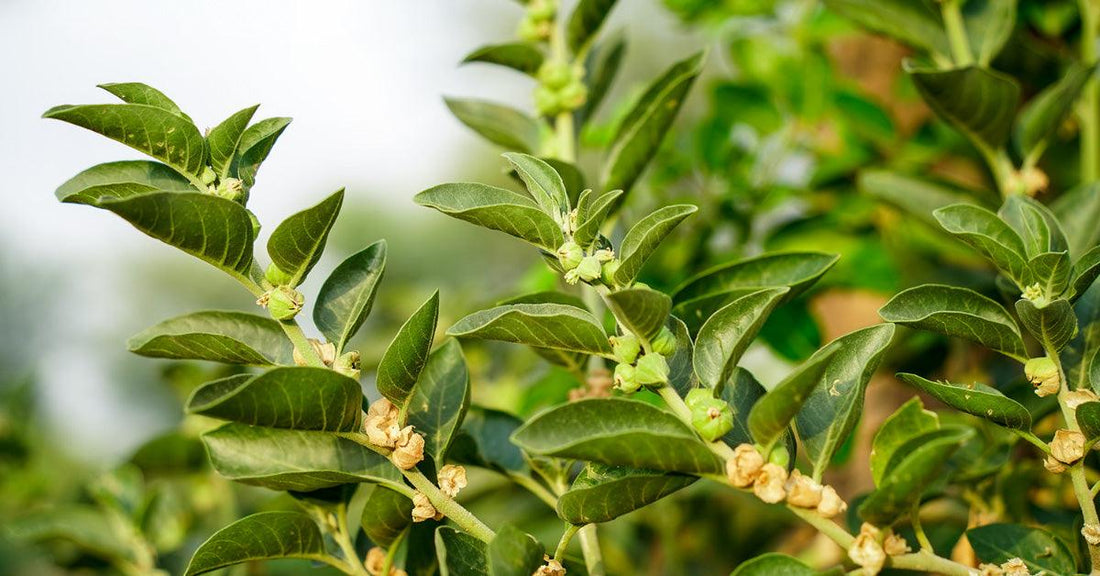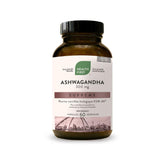Many of us are looking for tools to help us manage stress and increase our energy.nergy. Sport, meditation, laughter, healthy emotional management, nature walks and sleep hygiene are just some of the remarkable tools to support us.
In addition to aiming for a healthy lifestyle, we can also resort to the plant family known as "adaptogens", which help us adapt to life's circumstances.
Rhodiola, ginseng and ashwagandha are among the best-known and most popular adaptogenic plants.
Ashwagandhaashwagandha, a remarkable Indian plant, has attracted particular attention in recent years. Although many people have difficulty pronouncing its name, it is still very much in demand. in stores and online. No fewer than 162 studies and meta-analyses have been published on the Pubmed site in recent years!
Together, let's explore this plant in a little more detail, with its thousand and one virtues, origins, uses and contraindications.
All you need to know about ashwagandha
Etymology
Ashwagandha, also known as Indian ginsengmeans "strength of the horse" in Sanskrit.3. In Hindi, the language of India, Asganh means "the smell of horse sweat".1
We can already understand the strength of this plant simply by its etymology. Indeed, it is the number 1 plant in India for boosting the vitality (PRANA or CHI) of a tired or weakened person.1, 3
Part used and origines
Ashwagandha grows mainly in subtropical regions of India, Pakistan and Africa.1
Like the popular tomatoes and peppers, ashwagandha is a member of the Solanaceae family.1, 2 It can therefore also grow in our North American climate.
The active ingredients that give this plant its therapeutic virtues are concentrated underground. The part used is the root or rhizome, to be more precise.precise. The leaf may also be used in Ayurveda, but does not appear to be marketed here in Canada, at least not in the light of my research.
Generally dried and powdered, cultivated rhizomes can be used as is, in water, herbal tea or smoothie.
Inspired by Indian tradition, it could be blended into a milk with honey and ghee (Indian clarified butter), into a "golden milk" with turmeric, or made into a "Moon milk with traditional Indian spices, to make a pleasant drink.2, 3
It is also transformed into mother tincture (liquid extract in alcohol) or encapsulated to make its use in high doses more suited to today's lifestyles.
Originally, capsules were simply made of powder. Increasingly, however, highly condensed extracts are being used, ensuring unrivalled concentration of all components and optimal absorption of contents.
Constituents
The constituents of a plant are the molecules of which it is composed, and which have a therapeutic effect on the person consuming it. L’ashwagandha contains many well-known and lesser-known chemical substances: iron, tannins, antioxidants, alkaloids, lactones and flavonoids.
It is the alkaloids, particularly the withanolides and, to a lesser extent, somniferins, are considered the active ingredients.
They, or one of them (most often withanolides), are the active ingredients. withanolides) will be standardized, i.e. the manufacturer assures us, for example, that the 600 mg contained in each capsule contains 5% withanolides.7
We understand that not just any powder or capsule is equivalent to another. This explains the wide variation in prices and recommended dosages.
Take the time to read the side of the bottle and the small markings to make sure you know what you're buying.
Therapeutic dosage
Therapeutic dosage" refers to the minimum amount a plant must be consumed for its effects to be felt. In the store, I often find that customers expect results, but don't always take the full dose!
In the case of ashwagandha, dosages vary widely depending on the source consulted. The studies I consulted seem to have been carried out systematically with lower dosages (between 250 and 600 mg per day). 4 than traditional use, which is around 800 mg to 5000 mg.1, 2, 4
When in doubt, it's always best to start with small doses and slowly increase until you feel comfortable with the desired effect.
It's also a good idea to get to know yourself and question your own reaction to supplements. If, in general, you react intensely, a small dosage should suffice.
However, if you see almost no difference after taking a plant for a few weeks, there are 3 possible explanations:
- We're not listening closely enough ;)
- The product is not of sufficiently high quality (non-standardized extract)
- Simply, the dosage is too low and needs to be increased
Ashwagandha: its uses
Ashwagandha has many uses. Modern literature and traditional usage abound in its many benefits. Here are the main ones:
- Thyroid function
- Vitality
- Prevention of silent inflammation
- Stress management
- Reducing anxiety
- Improved sleep
- libido
- Cancer prevention.1, 2
Let's explore these benefits in more detail in the 3 systems where they mainly act.
The endocrine (hormonal) system
Central plant in hypothyroidism problems, ashwagandha supports the production of thyroid hormones (T3-T4).1
It is of particular interest if hypothyroidism is of autoimmune origin (Hashimoto's disease), since it simultaneously regulates immunity and acts as an anti-inflammatory.1 (9 out of 10 cases of hypothyroidism are of autoimmune origin).6
When we speak of hypothyroidism in naturopathy, we're mainly talking about non-optimal thyroid function.
The complex health of the thyroid can be a cause of fatigue (and many other symptoms) without affecting blood parameters (TSH within norms).
In fact, around 20% of men and 27% of women have antithyroid antibodies in their blood. In other words, the thyroid is constantly inflamed, but there is not necessarily any detectable disease, such as hypothyroidism (blood parameters within norms).
According to Mario Chaput, a leading Quebec naturopath, around 10% of the population suffers from hypothyroidism, but up to 40% of people have less than optimal thyroid health, or even live with subclinical hypothyroidism.6
Ashwagandha's role is mainly for people with less optimal health, since those who are diagnosed are often more "advanced" in their pathology, and so the plant will interfere with their medication (see contraindications).
Along the way, ashwangandha supports iron metabolism and helps maintain a healthy level of red blood cells.1
Many people experience a slight reduction in thyroid function when their iron levels are too low.
A good red blood cell count is also essential for good tissue oxygenation, energy and sleep.
Ashwagandha is also excellent for regulating cortisol.1the "stress" hormone which is essential for energy and optimal thyroid function, but which, in excess, makes us nervous, anxious and restless.
Its effects will therefore be remarkable on the energy and vitality of a tired, anxious person with blood parameters considered to be "close to the limit" for hypothyroidism and anaemia.
The nervous system
Ashwagandha acts as a nervous (or nervine) calming agent; it is the most calming adaptogen, making it excellent against anxiety. Its calming effect is due to an increase in GABA, a calming neurotransmitter.1 which regulates cortisol.5
Its adaptogenic and tonic action is excellent in cases of mental and physical fatigue with stress and anxiety, because it gives energy without over-stimulating as ginseng would.1, 2
It is traditionally used to optimize sleep without being a sleeping pill.1
The reality is that some people may be disturbed by its energizing effect, and its use should (for these people) be reserved for the daytime.
All in all, sleep requires a certain amount of "energy", and in the evening, ashwangandha can be very helpful, as its Latin name suggests: Witania Somnifera, in finding restful sleep.1, 2, 3
As you may have guessed, a person with a non-optimal thyroid and haemoglobin level could find their sleep affected by these issues, and for these reasons will benefit particularly from ashwagandha in the evening.
This plant supports the return of healthy sleep cycles.1 Especially if combined with the use of daylight and darkness at the right times of day, as well as lifestyle changes.
But don't be too stubborn about taking it in the evening if you don't see results.
The reproductive system
Widely recognized for increasing libido in both men and women, ashwagandha increases fertility, especially in men, through its stimulating action on testosterone and spermatogenesis.1, 5
This plant will therefore be of interest to stressed men who work out and would like to get closer to their partner, conceive a baby and/or build muscle mass.
Ashwagandha: contraindications and drug interactions
Never rely on the fact that a plant is natural to affirm that it is safe. Its potency does not come without restrictions, especially for people taking medication.1
Logically, ashwangandha would be contraindicated for someone suffering from hyperthyroidism, since it increases thyroid activity, which is already too high in this person.1 The same applies to a person with excess iron in the blood (hemochromatosis).
People with a sensitivity to the Solanaceae family should choose another adaptogen such as Rhodiola.1
In terms of drug interactions, this plant accentuates the effect of several medications, such as benzodiazepines (Valium, Xanax, Ativan), Syntroid and radiotherapy. You should therefore consult your doctor or pharmacist to find out whether this plant can be taken with your medication.
In conclusion
To sum up, ashwagandha is a plant that deserves to be better known. It is wonderful for the nervous, endocrine and reproductive systems.
We should think of it as soon as we notice the following symptoms: fatigue, overwork, lack of vitality, stress, loss of libido.
We also need to be sure of the quantity and quality of the active compounds we are ingesting to achieve the desired result.
However, we must never forget that a plant cannot replace a balanced lifestyle, healthy emotional management, an adequate psychosocial environment and the absence of dietary deficiencies.
If you're not sure whether an adaptogenic plant is right for you, it may be worthwhile to meet with a registered naturopath who can help you in your quest for greater vitality through natural methods that suit you.
About the author
Marie-France Trudelle, Certified Naturopath
In-depth knowledge of :
- Nutrition and dietary supplements
- Stress management and sleep
- Physical activity and movement
- Massage therapy
References
- Lessard, Manon, Phytothérapie, IESN, 2014
- https://ileauxepices.com/blog/2020/12/03/utiliser-ashwagandha-posologie-dosage/wpid30358/#:~:text=Ashwagandha in brief&text=
- https://mr-ginseng.com/ashwagandha/
- https://pubmed.ncbi.nlm.nih.gov/?term=ashwagandha
- https://www.ncbi.nlm.nih.gov/pmc/articles/PMC6750292/
- Chaput Mario, Le sommeil tranquille, natural solutions to insomnia, les éditions Québec livre, 2013, pages 63 to 70.
- https://laboiteagrains.com/products/ashwagandha-600-mg-natural-factors









